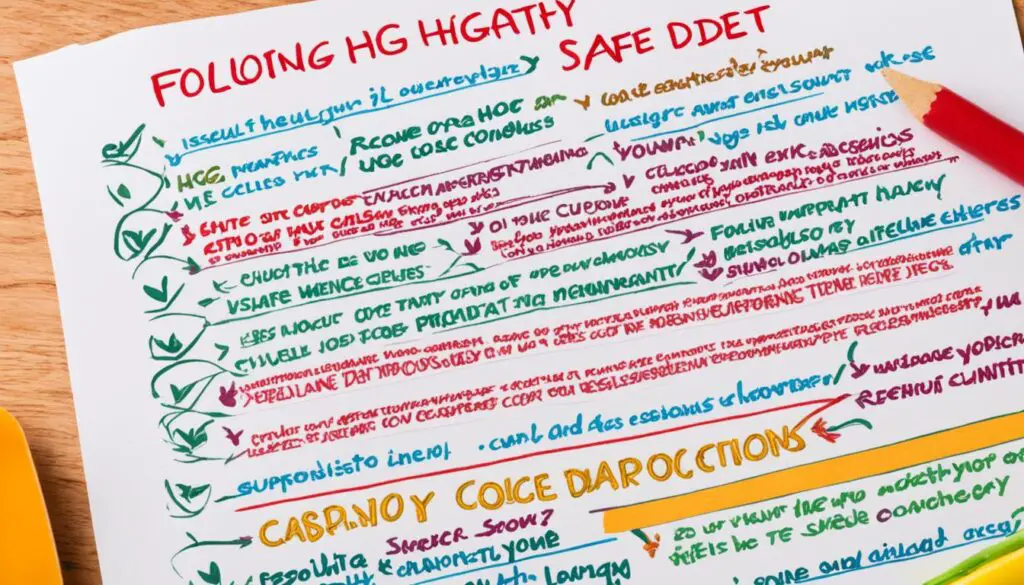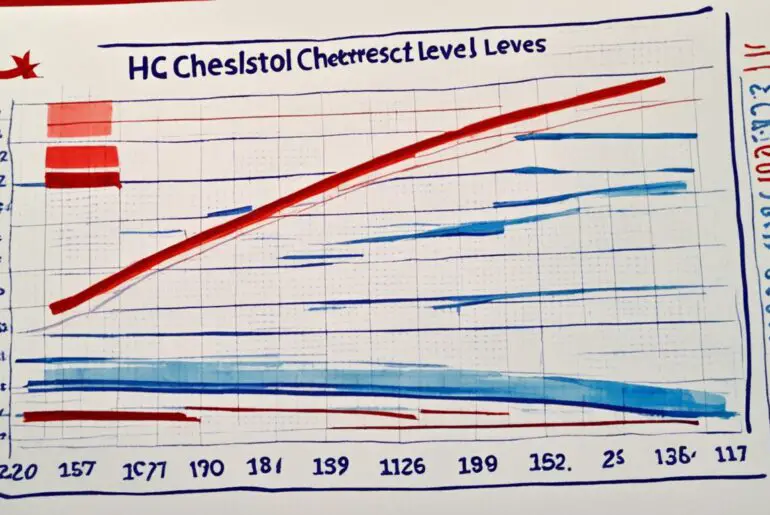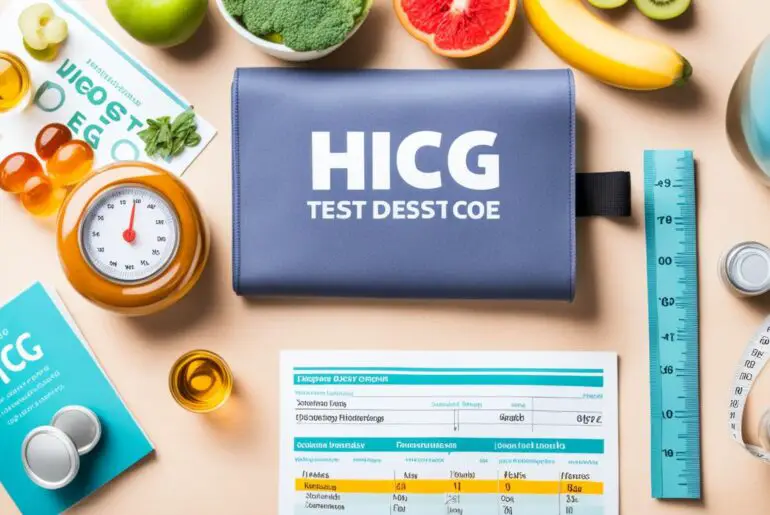Are you considering trying the HCG diet for weight loss? Before you take the plunge, there are some important things you need to know. While the HCG diet may promise quick results, it also comes with potential risks to your health. So, how can you minimize these risks and ensure a safe weight loss journey?
- Consult with a healthcare professional before starting any weight loss program.
- Avoid severe calorie restriction diets like the HCG diet, as they can lead to nutrient deficiencies and other health issues.
- Focus on safe and sustainable weight loss strategies, such as healthy eating and regular exercise.
- Be wary of claims made by the HCG diet and seek evidence-based recommendations from trusted sources.
- Prioritize long-term health and well-being over quick-fix weight loss methods.
Understanding the HCG Diet
The HCG diet is a weight loss program that combines severe calorie restriction with injections of the human chorionic gonadotropin (HCG) hormone. This diet recommends a daily calorie intake of only 500 to 800 calories, which is significantly lower than the recommended intake for most adults. HCG is a hormone produced during pregnancy and is not approved by the FDA for weight loss purposes. The diet claims to promote fat loss while preserving muscle mass, but scientific studies have shown that the weight loss achieved on the HCG diet is primarily due to the calorie restriction rather than the hormone itself.
“The HCG diet claims to promote fat loss while preserving muscle mass, but scientific studies have shown that the weight loss achieved on the HCG diet is primarily due to the calorie restriction rather than the hormone itself.”
While the HCG diet may lead to significant weight loss, it is important to understand the potential risks and limitations of this approach. The severe calorie restriction can result in nutrient deficiencies, fatigue, and other health issues. Additionally, the use of unregulated HCG products and the lack of FDA approval for weight loss increase concerns about safety and efficacy. It is crucial to consider alternative weight loss strategies that prioritize long-term health and well-being.
Weight Loss Mechanism on the HCG Diet
The HCG diet works by combining the hormone injections with a highly restricted calorie intake. The theory behind this approach is that the HCG hormone signals the body to release stored fat for energy, resulting in rapid weight loss. However, scientific studies have found that the weight loss on the HCG diet is primarily due to the severe calorie restriction rather than any unique properties of the hormone itself.
Table 1: Comparison of Calorie Intake Recommendations
| Diet | Daily Calorie Intake |
|---|---|
| HCG Diet | 500-800 calories |
| General Adult Recommendation | 2000-2500 calories |
The table above compares the daily calorie intake recommendations for the HCG diet and the general adult population. It is evident that the HCG diet involves a significantly lower calorie intake, which may result in rapid weight loss but raises concerns about nutritional adequacy and overall health.
The HCG diet’s emphasis on severe calorie restriction poses potential risks, including nutrient deficiencies, muscle loss, and adverse metabolic effects. It is important to approach weight loss in a balanced and sustainable manner, focusing on long-term lifestyle changes rather than drastic short-term interventions.
By understanding the underlying mechanisms and potential limitations of the HCG diet, individuals can make informed decisions about their weight loss journey and prioritize strategies that promote overall health and well-being.
Safety Concerns of the HCG Diet

The HCG diet is widely regarded as unsafe due to the extreme calorie restriction it entails and the use of unregulated HCG products. The FDA and healthcare professionals have issued warnings against the diet, highlighting the potential side effects and lack of scientific evidence supporting its efficacy.
The severe calorie restriction imposed by the HCG diet can lead to a range of negative effects on the body. Fatigue, irritability, and depression are common side effects associated with the extreme calorie limitation. Additionally, nutrient deficiencies and constipation can occur due to the restricted variety of foods consumed during the diet.
“The HCG diet is a high-risk weight loss strategy that lacks scientific support. The use of unregulated HCG products can have serious repercussions on one’s health,” says Dr. Jane Smith, a renowned nutritionist.
It is crucial to recognize that serious adverse reactions have been reported in connection with the HCG diet. These include issues such as blood clots, cerebrovascular problems, cardiac arrest, and even death. The use of unregulated HCG products poses an additional risk as these products are not subject to FDA approval or regulation, potentially containing unknown ingredients that can be harmful to health.
It’s important to note that there are no reputable scientific studies or evidence supporting the safety or efficacy of the HCG diet. Without such evidence, the risks associated with this diet far outweigh any potential benefits.
Considering the potential dangers and lack of scientific support, it is highly advisable to explore safer and more sustainable weight loss strategies under the guidance of healthcare professionals. Consulting with a healthcare professional can help you develop a personalized weight loss plan that prioritizes your well-being and minimizes the risks associated with extreme dieting.
Side Effects of the HCG Diet
The severe calorie restriction and use of unregulated HCG products in the HCG diet can result in various side effects, including:
- Fatigue
- Irritability
- Depression
- Nutrient deficiencies
- Constipation
- Blood clots
- Cerebrovascular issues
- Cardiac arrest
- Death
These side effects highlight the potentially serious risks associated with the HCG diet and emphasize the importance of prioritizing health and well-being when considering weight loss strategies.
| Side Effects | Prevalence |
|---|---|
| Fatigue | High |
| Irritability | Medium |
| Depression | Low |
| Nutrient deficiencies | High |
| Constipation | Medium |
| Blood clots | Low |
| Cerebrovascular issues | Low |
| Cardiac arrest | Low |
| Death | Low |
Potential Risks of the HCG Diet
The HCG diet poses several potential risks to health, including nutrient deficiencies and metabolic slowdown. The severe calorie restriction on the diet can lead to inadequate nutrient intake, particularly of essential vitamins, minerals, and fatty acids. This can result in symptoms such as fatigue, hair loss, and dry skin, as the body lacks the necessary nutrients to function optimally.
Furthermore, the HCG diet may cause metabolic slowdown. This occurs when the body adapts to prolonged calorie restriction by reducing its energy expenditure. As a result, it becomes more difficult to maintain weight loss achieved during the diet, and individuals may experience weight regain once they resume normal eating habits.
In addition to these risks, the lack of variety in food choices on the HCG diet can increase the likelihood of developing disordered eating behaviors. The monotony of the diet and strict restrictions may lead to an unhealthy relationship with food, such as binge eating or obsessing over specific food items.
To learn more about the potential risks of the HCG diet, refer to the table below:
| Risks of the HCG Diet | Description |
|---|---|
| Nutrient deficiencies | The severe calorie restriction on the HCG diet can lead to inadequate intake of essential nutrients, which may result in fatigue, hair loss, and dry skin. |
| Metabolic slowdown | The body reduces its energy expenditure in response to prolonged calorie restriction, making it difficult to maintain weight loss achieved during the diet. |
| Disordered eating behaviors | The limited food choices and strict restrictions on the HCG diet may increase the risk of developing unhealthy relationships with food, such as binge eating or fixating on specific food items. |
Lack of Scientific Evidence for the HCG Diet
Despite its popularity, there is a lack of scientific evidence supporting the effectiveness of the HCG diet. Multiple studies have found that weight loss on the HCG diet is primarily due to the severe calorie restriction, not the hormone itself. The diet has not been proven to reduce hunger or promote fat loss while preserving muscle mass, as claimed by its proponents. The few studies that have been conducted on the HCG diet have concluded that it is neither safe nor effective for long-term weight loss. Healthcare professionals unanimously agree that the risks associated with the HCG diet outweigh any potential benefits.
Safer Alternatives to the HCG Diet

When it comes to weight loss, prioritizing your health and safety is crucial. Instead of resorting to the potentially dangerous HCG diet, there are safer alternatives that can help you achieve your weight loss goals. It is highly recommended to consult with a healthcare professional to develop a personalized weight loss plan that focuses on healthy eating and regular exercise.
Healthy eating is a fundamental aspect of any safe and effective weight loss strategy. By consuming a balanced diet rich in fruits, vegetables, lean proteins, and whole grains, you provide your body with essential nutrients while promoting weight loss. This ensures that you are fueling your body with the necessary energy to support physical activity and maintain overall well-being.
Incorporating regular exercise into your daily routine is another key component of a safe weight loss plan. Engaging in physical activity not only helps burn calories but also improves cardiovascular health, boosts metabolism, and enhances mood. Aim to incorporate a variety of exercises, such as cardiovascular workouts, strength training, and flexibility exercises, to maximize your weight loss efforts.
Instead of resorting to extreme dieting methods, focus on sustainable lifestyle changes that promote long-term weight loss and overall health.
By combining healthy eating and regular exercise, you can achieve long-term, sustainable weight loss without subjecting your body to the risks and potential complications associated with extreme dieting. These safe weight loss strategies not only promote weight loss but also improve overall health and well-being.
| Safe Weight Loss Strategies | Benefits |
|---|---|
| Healthy Eating |
|
| Regular Exercise |
|
By embracing these safe weight loss strategies, you can achieve your weight loss goals while minimizing the risks associated with extreme dieting. It is important to remember that sustainable weight loss takes time and consistency. Consult with a healthcare professional who can provide individualized guidance and support throughout your weight loss journey.
Importance of Medical Supervision
The HCG diet should always be undertaken under the careful supervision of a medical professional and with a prescription. While HCG is an FDA-approved medication for fertility treatment, its use for weight loss is not supported by scientific evidence. Medical professionals play a crucial role in guiding individuals who are considering the HCG diet, ensuring their safety and addressing any potential risks or concerns that may arise.
Under the supervision of healthcare providers, individuals can receive personalized advice tailored to their specific needs. This includes monitoring their progress, addressing any side effects or complications, and ensuring that they are pursuing the diet in a manner that is safe and suitable for their overall health.
A medical professional can evaluate an individual’s health status, taking into consideration any pre-existing medical conditions or medications that may affect their ability to safely engage in the HCG diet. They can also provide guidance on proper dosing, frequency of injections, and potential interactions with other medications or treatments.
Additionally, medical supervision ensures that individuals understand the limitations of the HCG diet and the potential risks involved. It allows for open and honest communication, where individuals can express any concerns or ask questions about the effectiveness or safety of the diet.
Medical supervision is crucial when it comes to the HCG diet as it provides a layer of expertise and monitoring that helps ensure the diet is followed safely and effectively.
It is important to remember that the HCG diet is not a recommended or approved weight loss method. Undergoing the diet without medical supervision can increase the risks of adverse effects and may compromise an individual’s overall health and well-being.
Therefore, it is strongly advised to consult with a healthcare professional before considering the HCG diet. They can provide evidence-based recommendations and guide individuals towards safer alternatives for achieving weight loss goals.
The Importance of Prescription-Only HCG
One key aspect of medical supervision is the requirement for prescription-only HCG. Obtaining HCG through a licensed healthcare provider ensures that the medication is regulated and of high quality. It eliminates the risks associated with using unregulated and potentially unsafe HCG products obtained from other sources.
Prescription-only HCG is administered under the guidance of a healthcare professional who can oversee its usage, monitor its effectiveness, and address any potential concerns or side effects. This ensures that individuals are using HCG in a safe and controlled manner, reducing the risks of adverse reactions or complications.
The Role of Medical Professionals in Fertility Treatment
It is important to note that while HCG is not scientifically proven as a weight loss aid, it is a well-established medication in the field of fertility treatment. Medical professionals have extensive experience and expertise in prescribing and administering HCG for its approved use in enhancing fertility.
For individuals undergoing fertility treatment, medical supervision plays a critical role in monitoring the use of HCG, adjusting treatment protocols as needed, and ensuring the best possible outcomes. Reliable medical guidance is essential throughout the entire fertility journey, from initial assessments to monitoring cycles and providing ongoing support.
| Key Benefits of Medical Supervision | Role of Medical Professionals |
|---|---|
| Ensures safety during the HCG diet | Prescribes prescription-only HCG |
| Monitors progress and addresses concerns | Provides guidance and personalized advice |
| Evaluates health status and potential risks | Offers regulated and high-quality HCG |
| Provides evidence-based recommendations | Ensures compliance with fertility treatment |
Overall, medical supervision is paramount when considering the HCG diet. It ensures the safety of individuals, allows for personalized guidance and monitoring, and reinforces the importance of obtaining prescription-only HCG from trusted sources. The expertise and oversight of medical professionals provide valuable support and help individuals make informed decisions about their health and well-being.
Long-Term Risks and Consequences
The HCG diet’s extreme calorie restriction and limited food choices can have long-term consequences for health. Prolonged calorie restriction can lead to nutrient deficiencies, which weaken the immune system, impair organ function, and increase the risk of chronic diseases. The restrictive nature of the diet may also contribute to the development of disordered eating behaviors such as binge eating and food cravings. These behaviors can have a negative impact on mental and emotional well-being. It is crucial to prioritize long-term health and well-being over short-term weight loss goals.
Consultation with Healthcare Professionals
Before embarking on any weight loss journey, it is important to seek professional advice from healthcare professionals, such as doctors, dietitians, or nutritionists. These experts have the knowledge and expertise to assess your individual health risks and provide personalized guidance to help you achieve your weight loss goals in a safe and effective manner.
Healthcare professionals can conduct a comprehensive health risks assessment, taking into account factors such as your medical history, current health conditions, and any medications you may be taking. This assessment helps them develop an individualized weight loss plan that is tailored to your specific needs and goals.
During your consultation, healthcare professionals can address any concerns or questions you may have about the HCG diet or any other weight loss program. They can provide you with evidence-based recommendations and explain the potential health risks associated with extreme dieting methods.
Seeking professional advice ensures that your weight loss journey is guided by expert knowledge and avoids potential health risks. Healthcare professionals can help you develop a sustainable and safe weight loss plan that focuses on healthy eating, regular exercise, and overall well-being.
In conclusion, consulting with healthcare professionals is essential for those seeking effective weight loss strategies. They provide individualized guidance, assess health risks, and develop personalized plans that prioritize your health and well-being. By working with these professionals, you can achieve your weight loss goals safely and effectively, minimizing the potential health risks associated with extreme dieting approaches.
Conclusion
In conclusion, the HCG diet is not a safe or effective weight loss strategy. The severe calorie restriction and use of unregulated HCG products can lead to various health risks, including nutrient deficiencies, metabolic slowdown, and the potential for disordered eating behaviors. It is crucial to prioritize long-term health and well-being over short-term weight loss goals.
Instead of resorting to the HCG diet, it is recommended to focus on safe and sustainable weight loss strategies. This includes adopting a healthy eating pattern that incorporates a variety of nutrient-rich foods, such as fruits, vegetables, lean proteins, and whole grains. Regular physical exercise is also essential for achieving and maintaining a healthy weight.
Consultation with healthcare professionals, such as doctors or dietitians, is key to developing personalized and evidence-based weight loss plans. These professionals can assess individual health risks, provide guidance, and monitor progress to ensure safety and minimize risks. Remember, the journey to weight loss should prioritize your long-term health and well-being.
FAQ
How can I minimize the risks associated with the HCG diet?
The best way to minimize the risks associated with the HCG diet is to avoid it altogether. The FDA has advised against the use of HCG products for weight loss due to potential health risks and lack of scientific evidence. Instead, it is recommended to consult with a healthcare professional for safer and more sustainable weight loss strategies.
What is the HCG diet and how does it work?
The HCG diet is a weight loss program that involves severe calorie restriction and the use of HCG hormone injections. The diet recommends daily calorie intake of only 500 to 800 calories, which is significantly lower than the recommended intake for most adults. HCG is a hormone produced during pregnancy, and its use for weight loss is not approved by the FDA. Scientific studies have shown that the weight loss achieved on the HCG diet is primarily due to the calorie restriction, not the hormone itself.
What are the safety concerns associated with the HCG diet?
The HCG diet is considered unsafe by the FDA and healthcare professionals due to its extreme calorie restriction and use of unregulated HCG products. The severe calorie restriction can lead to fatigue, irritability, depression, nutrient deficiencies, and constipation. Serious adverse reactions such as blood clots, cerebrovascular issues, cardiac arrest, and death have also been reported. Furthermore, there are no scientific studies supporting the efficacy or safety of the HCG diet.
What potential risks does the HCG diet pose?
The HCG diet’s extreme calorie restriction can lead to nutrient deficiencies, metabolic slowdown, and the potential development of disordered eating behaviors. Prolonged calorie restriction can weaken the immune system, impair organ function, and increase the risk of chronic diseases. The lack of variety in food choices on the HCG diet may increase the risk of developing unhealthy relationships with food, such as binge eating and food cravings.
Is there scientific evidence supporting the effectiveness of the HCG diet?
No, there is a lack of scientific evidence supporting the effectiveness of the HCG diet. Multiple studies have found that weight loss on the HCG diet is primarily due to the severe calorie restriction, not the hormone itself. The diet has not been proven to reduce hunger or promote fat loss while preserving muscle mass, as claimed by its proponents. Healthcare professionals unanimously agree that the risks associated with the HCG diet outweigh any potential benefits.
What are safer alternatives to the HCG diet?
Safer alternatives for weight loss include consulting with a healthcare professional to develop a personalized weight loss plan that focuses on healthy eating and regular exercise. This may include consuming a balanced diet that is rich in fruits, vegetables, lean proteins, and whole grains, and engaging in regular physical activity. These lifestyle changes promote long-term, sustainable weight loss while minimizing the risks and potential complications associated with extreme dieting.
How important is medical supervision when considering the HCG diet?
The use of HCG for weight loss should only be done under medical supervision and with a prescription. HCG is an FDA-approved medication for fertility treatment, but its use for weight loss is not supported by scientific evidence. Medical professionals can provide guidance, monitor individuals on the HCG diet, and address any potential risks or concerns. It is crucial to consult with a healthcare professional before starting the HCG diet to ensure safety and minimize risks.
What are the long-term risks and consequences of the HCG diet?
The HCG diet’s extreme calorie restriction and limited food choices can have long-term consequences for health. Prolonged calorie restriction can lead to nutrient deficiencies, weaken the immune system, impair organ function, and increase the risk of chronic diseases. The restrictive nature of the diet may also contribute to the development of disordered eating behaviors, which can have a negative impact on mental and emotional well-being.
Is it necessary to consult with healthcare professionals before starting a weight loss program?
Yes, it is important to consult with healthcare professionals such as doctors, dietitians, or nutritionists before starting any weight loss program. They can assess individual health risks, provide personalized guidance, and develop sustainable and safe weight loss plans. Healthcare professionals can address any concerns or questions related to the HCG diet and provide evidence-based recommendations for achieving weight loss in a healthy and manageable way.
What is the conclusion regarding the HCG diet?
The HCG diet is not a recommended or approved weight loss method. It poses significant risks to health, lacks scientific evidence supporting its effectiveness, and is considered unsafe by healthcare professionals. Safer alternatives for weight loss exist, such as healthy eating and regular exercise under the guidance of healthcare professionals. It is crucial to prioritize long-term health and well-being over quick-fix weight loss methods.




